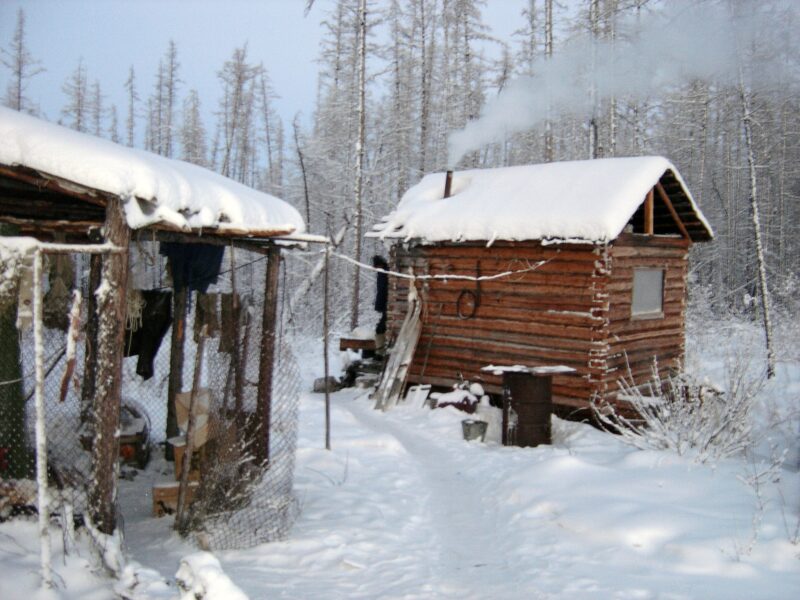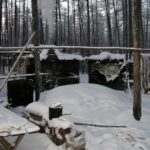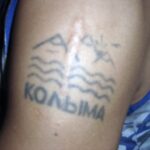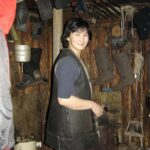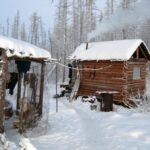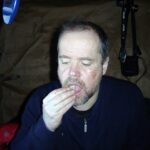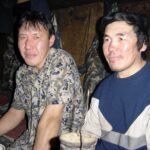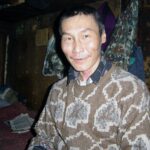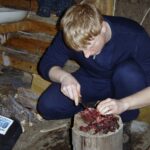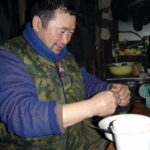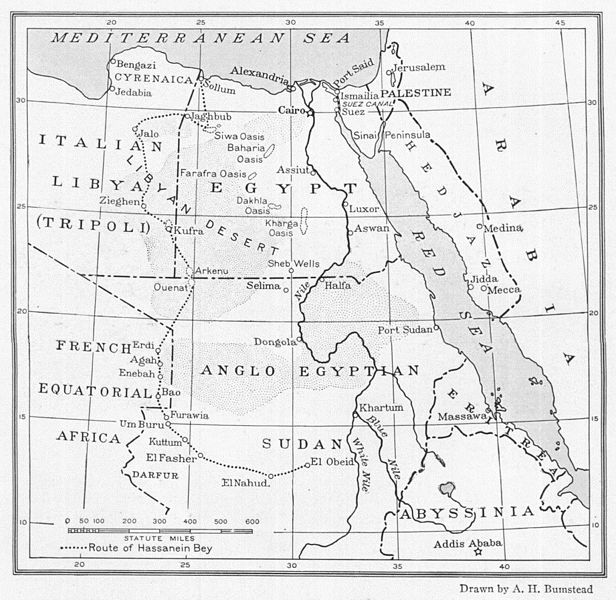It is the 26th of December 2004 today and we’re holed up in our little apartment here in Srednekolymsk. The temperature is a mere -26°F, but there’s a southwesterly making life fresh enough. Sufficient enough to give us a frostbite if not careful.
“I only work here” ,Nasha explains when I ask her how she ended up in this log cabin, “I cook for the guys. This is Dimas house.”
We had almost scared the life out of her, when we turned up at Dimas tiny log cabin the other day, located 15 km:s south of Srednekolymsk. She was preparing a hare stew when we made our way into the cabin, dressed in our big down jackets, the big black facemask and greeted her in broken Russian. It took at least three minutes before she recovered from the chock of seeing us and suppressing her scream of fright.
“But I am born in Srednekolymsk, where my parents live” , she continued, “but Dima lives here all the time.”
Nasha had too many modern ways, so I had problems to understand why she choose to live in a tiny log cabin like this, working as a cook. Even though I was well aware of the lack of work to be found in Srednekolymsk. She was around 30 years of age, she was dressed in jeans and a skin vest and was very articulate and seemed well read and seemed to know about most things regarding what was going on in the outside world. She was half Russian and half yakut. Her place of work, Dimas cabin, was not only run down, it was also rather primitive, with an earth floor and polyethylene bags covering the windows. It seemed, contrary to what we were used to, disorganized, dirty and not well kept. Maybe due to the fact that 4 people were sharing it and that there was very little room to move about and store gear. The room in itself was not more than 40 square meters in size and the logs that made up the walls were covered by snares and fishnets. Fur clothes, boots and fur hats were drying on lines that crisscrossed the room. The only existing light in the darkness was 3 oil lamps which dimmed the room enough to see. The room was, to say the least, drafty. Small wooden bunks with moose skins as mattresses covered ¾ of the walls and the stove and firewood the other part. But Nasha seemed to enjoy life. And when Dima showed up in thick fur clothes an hour later, she smiled heavenly, and then there was no doubt what had brought her out here from the civilization in Srednekolymsk, love.
“Did you catch anything today?” ,she asked Dima, who shook his head and said: “Not one single hare caught in the snares.”
Dima shakes our hands with a strong grip, returns immediately outside and comes back in with a big frozen raw liver from the fish called Nalim. Our favorite snack, maxa. He chops it up in pieces, places it in front of us together with a plate of salt. He is as kind, friendly and warm as everybody else we’ve come across the Kolyma.
“Are you guys staying over night?” asks Nasha and when we ask if that is ok, she answers: “Not a problem at all, just asked to find out how much food I should prepare.”
“You’re are the skiers I suppose?” Dima asked, lit his fourth cigarette since coming in and there was no doubt that he was very fit, he was a lean yakut in my own age, 42, who survived entirely on hunting, trapping and fishing.
“I’ve heard you’ve cycled through the Sahara desert. What was that like?” he continued. There was no doubt that he had either read the local newspaper or heard about us through the grapevine.
“Hot” ,I answered and that made Dima laugh out loud in a way, making it easy to see that he like most other men along the Kolyma, lacked front teeth.
Too much smoking and too much sugar are the primary reasons. One little spoon of sugar in the tea is unheard of for the people living along the Kolyma, 3 or 4 big spoons is normal.
“I was a soldier in Mongolia during the Soviet epoch and I was stationed in the Gobi desert” , he told us, “so I understand very well.”
“Did you suffer as much from the heat as the Caucasian Russians did?” I asked him quickly.
“I didn’t suffer from the heat at all” ,he laughed, “but the Russians, they suffered all the time.”
Many of the Soviet elite troops during the second World War consisted of yakuts. Both men and women. They were considered the hardest and toughest of all soldiers. A forth of all yakut soldiers lost their life due to this. Most women. There’s a few monuments in Srednekolymsk honoring local heroes who died during that war.
Anyhow, I just have to tell you this, before the saga of Dima and Nasha continues, we went to visit the local chief here, Mr Grigorjev, and ended up not only being invited for New years Celebrations at his home, but he gave us 100 kg (!) of potatoes and lot’s of dried fish as a gift! This is human reality along the Kolyma! (That would never happen in the rich west!)
“Maybe you don’t know” ,Dima said, “we yakuts originated not far away from Mongolia once. Therefore, neither freezing cold or steaming heat is not a big problem for a yakut.”
Some kind of a natural disaster forced the yakuts north of the great Lake Baikal around a thousand years ago. They eventually ended up in the barren and extremely cold northeastern part of Siberia. They’ve acclimatized extremely well and they’re the dominant group of people in the state of Yakutia today. And in Srednekolymsk. When perestroika struck the Soviet Union, the yakuts immediately declared the state of Yakutia as independent, but most of them today seems to see themselves as part of Russia. At least along the Kolyma. However, they have their independent laws which govern the state, not the federal ones. They are an independent, healthy looking and proud people and the green and white flag of Yakutia is seen all over Srednekolymsk.
“You do eat everything, don’t you?” Nasha asked, slightly worried, and we answered in truthfully unison: “For sure! We love the local food!”
It is of uttermost importance, when being a guest amongst other people, always to eat and enjoy the local food. It tears down barriers in a way nothing else can do. If you want to build a barrier, however, one should say no to the offerings of food. Showing disgust, you make enemies. During the time we continued talking hunting and fishing with Dima, Nasha went out into the freezing cold outer room of the building. A room as big as the one we were inside. A roofed space which is to be found in every house along the Kolyma. This is were people keep their food and other things. There’s a variety of frozen fish all over the room, barrels of dried salted fish, frozen bread, other types of dried fish, pieces of meat, bones, fishing nets, an array of equipment and the odd three legged hare which has been caught in the trap and the odd frozen and well preserved squirrel. There’s a little bit of a queasy smell about it, but not bad, just plain odd. Nasha had made a big fire in an open fireplace and placed a big pot of hare stew on top of it. A pipe led from this fireplace through the ceiling upon to the roof, where it ended up in another stove, which had been remodeled as a place where one smokes fish. A kind of a cold smoker, I guess. And, one thing is for sure, the smoked fish we’ve been eating along the Kolyma is far better than anything I’ve smoked myself or eaten back home. It’s tender, tasty and not over-smoked which is often the case back home. But the best if all, is still the dried fish which has sun dried a couple of days during the summer, than placed in a airtight barrel, pressed hard until all air is gone and than a lid is place on the barrel. Just heavenly!
“Are you married? I can see you have a ring on your finger?” Nasha asks, when she returns inside again. And, as usual, if I have any children and if Johan is my son.
“Yes” I answered and continued to tell the same story as usual. Johan is not my son, and I have no children.
Answers that normally worry people. But in the Kolyma part of Yakutia, it just doesn’t matter whether the kids are your own or not. Very few are married, or get married, most seem to change partners at least once in a life time and therefore they’re all, more or less, like me, step-parents. This fact applies both amongst moved in Russians and the local native people. And, Kolyma, is probably the only place I’ve ever visited or explored, where absolutely nobody have asked if I believe in the Lord and what religion I have. The yakuts along the Kolyma, are all, more or less, pagans. A reality consisting of many different spirits, ghosts and gods. A down-to-earth religion where shamans have a place and it is , of course, close to nature itself. And it is all free of missionaries. (I will tell you more about this animist religion the 19th of January, when there’s a big ceremony going on along the Kolyma. A feast for the spirits of the River.)
“Time to eat” , Dima acknowledges suddenly, helps Nasha to serve the meal and at this moment, the two other inhabitants of the cabin turns up, two young lads who immediately rolls a cigarette from a newspaper and calmly sits down at the table.
They’ve spent the day sawing timber with an ancient saw, really hard going, and they’ve checked most nets under the ice of the Kolyma for fish. One of them lacks fingers on one of his hands.
“Ah, it’s nothing” ,he answers when I ask what has happened, “it is not my own fault. It is the vodka. I got drunk and fell a sleep outdoors a few years ago, when it was terribly cold, and I lost all fingers on this left hand.”
The hare stew is heavenly as usual. When finished, there’s dried fish and tea. We Swedes almost fall asleep immediately, at the same time as the others play another game of cards.
See the documentary, Minus 75 degrees, here https://vimeo.com/451752697
